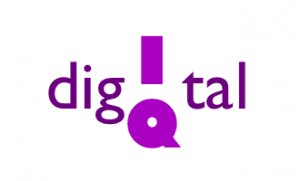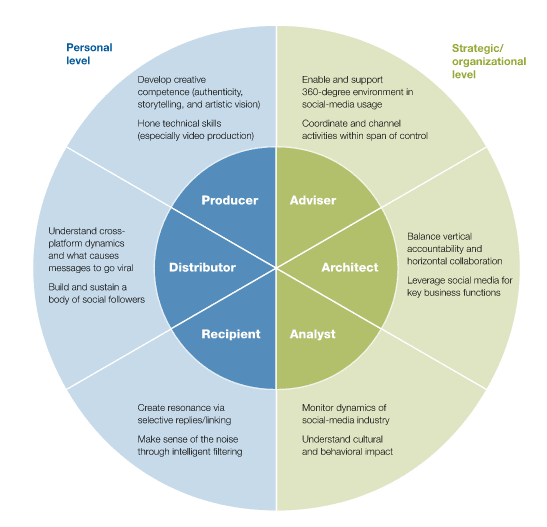In driving digital transformation, I have long called for executive leadership to be the change they are wishing to see happen within the organization and to up the executive digital IQ. In a short cut, this would mean that the top executive should not just sponsor, encourage and invest money in digital, it means that they should be personally acting and interacting on the internet (or mobile). Simply put, without living the consumer online experience, it is very complicated to understand, decide and invest in effective digital marketing. It may not be impossible, especially if the top brass has surrounded itself with motivated, talented and liberated digital marketers. However, that is rarely the case, if only because such talent is few and far between.
Social Media Literacy
McKinsey published a very interesting article, written by Roland Deiser and Sylvain Newton, entitled “Six social-media skills every leader needs.” The article puts nuance on “being” digital, using as a real-life laboratory, General Electric. They categorized the way a leader can use or be digital into six different dimensions (where blue represents on a personal level and green on a strategic or organizational level):
- Producer
- Distributor
- Recipient
- Distributor
- Analyst
- Adviser
They call “the interplay of leadership skills and related organizational-design principles organizational media literacy,” which is a little more sophisticated than the Digital IQ term I have been using, and goes beyond the concept of a singular Chief Digital Coach to help mobilize the company and engineer the digital transformation. I found the article provocative and eminently realistic, being based on a real-life case.
Leadership ‘unplugged’
Among the items that I really liked about the article is the notion of being “unplugged.” In a paradox, the term “unplugged” refers to being more plugged in than most! {Click to Tweet} In essence, when a leader is a producer of content, that content doesn’t necessarily pass through the hands of the Communications team, or by the eye of a creative agency. Let it stay raw, to maintain the authenticity of the content.
Digital transformation via Reverse Mentoring
The article rightly points out the opportunity to use the influx of the younger generation to help accelerate the change. “As a new and media-savvy generation enters the workplace, smart leaders can accelerate organizational change by harnessing these digital natives’ expertise through “reverse mentoring” systems…” However, this younger generation is often not as plugged in with the ways social media can or needs to be used, especially as executives. The lack of experience can lead to a de-credibilizing of the social media opportunities…
Video killed the … powerpoint star
The other brilliant insight came from the idea of converting from a powerpoint-style of presentation to a video format in order to create a history profile on the company with an up-to-date timeline of the business. By using video — which isn’t exactly a new media as the article suggests — the project brought team members together around a common goal. By using a new format and by cutting through the silos, the project seemingly helped to unify and ignite the group. They write that “[b]oosting engagement with stakeholders such as customers is an added benefit, since videos often include them in segments to help tell stories.” I would particularly stress that the engagement must start with the employees.
Intellectual versus exercise…
Whereas all leaders know that digital transformation is increasingly important, if not unavoidable, the issue is moving from an intellectual exercise to a bona fide personal practical exercise, where the leaders truly use at the same time as analyzing, guiding, promoting the digital culture and social media literacy.
 The article describes the typologies of executives who are doing what they can to promote social media literacy and inspire the digital transformation. The issue is that there are still a good number who, hiding behind the more “analytical” — even reptilean — reflex are too embarrassed, fearful or arrogant to use social media and digital tools themselves.
The article describes the typologies of executives who are doing what they can to promote social media literacy and inspire the digital transformation. The issue is that there are still a good number who, hiding behind the more “analytical” — even reptilean — reflex are too embarrassed, fearful or arrogant to use social media and digital tools themselves.
Above all, Digital IQ — or organizational social media literacy — is not about knowledge. It is about mindset. {Click to tweet} Creating hands-on projects that cut through the silos and use new media can be a great way to kick start the cultural change. But it takes leadership that demonstrates that it no only believes, but acts, digitally.
Your reactions please!













Hi Minter,
thanks so much for taking a closer look at our piece and bringing our thoughts to a new level through adding your perspective. I am particularly glad that you emphasize the importance of "unplugged leadership" as key for authentic communication. We all know that the all too often streamlined and polished appearances of leaders are the enemy of meaningful conversations which are so essential for creating a culture of trust, engagement and strategic innovation. As you mention, digital IQ is not about knowledge but about mindset, and understanding the power of being raw and acting just in time is an important part of it.
Let's stay in touch!
Roland
Hi Minter,
thanks so much for taking a closer look at our piece and bringing our thoughts to a new level through adding your perspective. I am particularly glad that you emphasize the importance of "unplugged leadership" as key for authentic communication. We all know that the all too often streamlined and polished appearances of leaders are the enemy of meaningful conversations which are so essential for creating a culture of trust, engagement and strategic innovation. As you mention, digital IQ is not about knowledge but about mindset, and understanding the power of being raw and acting just in time is an important part of it.
Let's stay in touch!
Roland
I agree very, not live the experience that has the users will not be possible to propose effective strategies that reach the appropriate segment and will be a proper communication
I agree very, not live the experience that has the users will not be possible to propose effective strategies that reach the appropriate segment and will be a proper communication